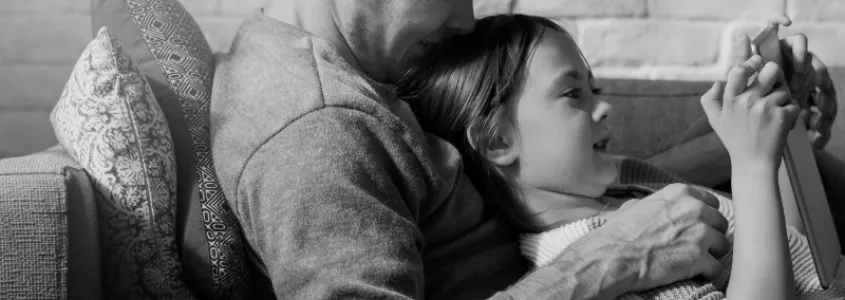
Table of contents
When a separation or divorce occurs in a couple with children, both parents have the obligation to provide them with maintenance. However, the parent who does not have custody and does not live with them must do so in the form of alimony, a figure that often creates more controversy than it seems, as our divorce lawyers can attest. Therefore, here we would like to explain what alimony is and what exactly it includes.
What is child maintenance?
Child maintenance is a financial amount that the non-custodial parent must pay to cover the indispensable expenses that his or her offspring need to live. In fact, according to the provisions of article 142 of the Civil Code, 'maintenance' means everything that has to do with sustenance, clothing, medical care and housing or residence.
Alimony and what exactly it includes
First of all, both parents are obliged to pay maintenance to their children as long as they are minors. But also when they have reached the age of 18 and live in the family home or have been emancipated as long as they have no income of their own for reasons that are not directly attributable to them. This would be the case, for example, if the young person is still studying at that age.
In addition, maintenance under the Civil Code is also an obligation of the parents, even if the child is not yet born. This is the reason why all expenses related to childbirth and pregnancy can be included in the maintenance allowance.
However, the maintenance allowance includes two different types of expenses:
Ordinary expenses
Ordinary expenses are defined as any regular and foreseeable outlay of money that is indispensable for the support of the children. Here are some examples:
- Daily food.
- Schooling expenses: materials, textbooks, uniforms, transport, etc.
- Housing.
- Health care.
- Personal belongings and hygiene.
- Leisure activities.
- Extraordinary expenses
Extraordinary expenses, on the other hand, are those which are not included in the maintenance allowance because of their inherent contingency and the impossibility of foreseeing them in advance. However, not all extraordinary expenses are the same:
- Necessary extraordinary expenses: these are expenses that arise unexpectedly but have to be borne by the parents. We are talking, for example, about orthodontic treatment. The consent of the non-custodial parent is not required for it to be carried out and to have to pay for it.
- Extraordinary expenses that are not necessary: here the consent of the non-custodial parent is indispensable. He or she may not pay them if he or she does not wish to do so, in which case it will be the other spouse who will have to pay them alone. These include, for example, gym membership fees, sports lessons, etc.
Usually, these extraordinary expenses are provided for in the divorce settlement agreement or court judgement. Specifically, the rule states that they are to be paid on a 50/50 basis between the two parents.
Do I have to pay child support even if I am going to spend a month with my child?
It is these ordinary and extraordinary expenses that constitute child maintenance. Moreover, it must be paid by the parent who is obliged to do so every month of the year. That is to say, even if, according to the divorce decree or the agreement, he or she is entitled to have the child spend one month with him or her on holiday, he or she must also pay for that month.
This is because the competent courts consider child maintenance to be a compulsory annual amount to be paid on a monthly pro rata basis.
How is the amount of maintenance determined?
This is somewhat difficult to answer as it depends on each individual case. However, we can say that there are three main factors that have an influence:
- The assets of the parents.
- The number of children.
- The general and specific needs of each child.
On this basis, and provided there is no prior agreement between the parents, the judge will decide what amount is fair. However, if the conditions of the father and/or mother change in the future, the amount of maintenance can be modified.
Modification of the amount of alimony
This is regulated in Article 142 of the Civil Code. In particular, it provides that the amount of maintenance shall be increased when:
- The assets of the spouse liable to pay maintenance or the maintenance provider have grown substantially after the divorce settlement agreement was signed or the court judgment regulating the divorce was published.
- The children's needs have increased. This is often the case when they have to attend university and have to go away from their place of residence to study.
- The assets of the custodial parent, i.e. the parent who lives with the children, have been significantly reduced, in which case the other parent must compensate at least temporarily.
But, equally, the amount of maintenance may be reduced if the opposite of the above-mentioned cases occur, i.e. if the assets of the maintenance provider are reduced, if the assets of the custodial parent are significantly increased or if the needs of the children are reduced.
Temporary or definitive suspension of the maintenance obligation
If there are children entitled to maintenance from their parents, maintenance cannot be definitively suspended under any circumstances. In fact, this could only be done temporarily and very exceptionally if the non-custodial spouse has no financial means at his or her disposal.
These are the other cases in which the child maintenance obligation is terminated:
- The parent obliged to provide maintenance dies.
- The child increases his or her assets or has a trade or profession that enables him or her to provide for his or her own subsistence.
- The child is disinherited after committing a legally permissible offence.
- The child's need for maintenance is due to his or her lack of employment or misconduct.
That said, we would like to point out that age does not in any way lead to the suspension or termination of the maintenance obligation. All children over the age of 18 who continue to reside in the family home and who have no income of their own for reasons that cannot be attributed to them must continue to receive maintenance.
Non-payment of maintenance
If the non-custodial parent does not pay the amount of maintenance, the non-custodial parent has the right to claim it within a period of up to 5 years. To do so, he or she must initiate civil proceedings for enforcement of the judgment in order to urge the non-custodial parent to pay. If he or she fails to do so, the competent judge may order the attachment of the paycheck or any other income that the provider may have at his or her disposal. In addition, it should be noted that failure to pay the child support may lead to a charge of abandonment of the family.
We hope that this has clarified your doubts about alimony and what it includes.

"Anywhere in Spain"
With our online appointment system you will have immediate advice without the need for face-to-face visits or travel.
One of our lawyers specialized in your area of interest will contact you to formalize an appointment and make your consultation by video call.

Add new comment